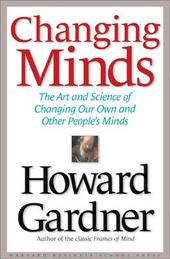
|
Changing Minds: The Art and Science of Changing Our Own and Other Peoples Minds
Hardback
Main Details
| Title |
Changing Minds: The Art and Science of Changing Our Own and Other Peoples Minds
|
| Authors and Contributors |
By (author) Howard Gardner
|
| Series | Leadership for the Common Good |
|---|
| Physical Properties |
| Format:Hardback | | Pages:288 | | Dimensions(mm): Height 241,Width 167 |
|
| Category/Genre | Business and management |
|---|
| ISBN/Barcode |
9781578517091
|
| Classifications | Dewey:658 |
|---|
| Audience | | Professional & Vocational | |
|---|
|
Publishing Details |
| Publisher |
Harvard Business Review Press
|
| Imprint |
Harvard Business Review Press
|
| Publication Date |
1 April 2004 |
| Publication Country |
United States
|
Description
Whether you're an advertiser trying to convince consumers to switch brands, a CEO trying to change the culture of a company, or an individual trying to reconcile a long-standing rift with a friend - changing someone's mind is an incredibly difficult task. Why do we become set on a particular way of thinking? What actually happens in our minds as we shift from one perspective to a dramatically different one? And what forces impel or hinder mind change? In this important book, eminent Harvard psychologist Howard Gardner, whose work has revolutionized our beliefs about intelligence, creativity, and leadership, offers an original framework for understanding the universal mystery of human mind change. Drawing on decades of cognitive research, Gardner introduces seven powerful factors - ranging from reason to real world events to resistance - that bring about or thwart significant changes of mind. Through compelling case studies of mind change agents from the famous to the ordinary, Gardner reveals exactly what happens during the course of mind change and how to effectively influence that process. Whether your audience is a nation, a group of colleagues, a spouse, or yourself, this book provides insights and tools for changing minds in ways that improve and enrich our lives.
Author Biography
Howard Gardner is the John H. and Elisabeth A. Hobbs Professor of Cognition and Education at the Harvard Graduate School of Education. He also holds positions as Adjunct Professor of Psychology at Harvard University, Adjunct Professor of Neurology at Boston University School of Medicine, and Co-Director of Harvard Project Zero. In 1981, Gardner received a MacArthur Prize Fellowship. He has written over 15 books and several hundred articles, and is best known for his groundbreaking work on the theory of multiple intelligences.
|